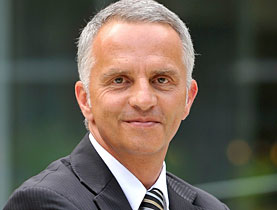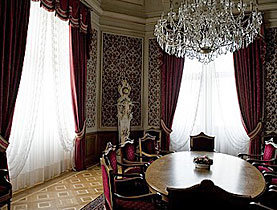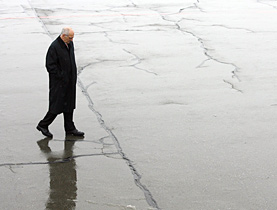New cabinet member has “politics in his blood”

The media-shy Neuchâtel economist Didier Burkhalter has stepped out of the Swiss political shadows and into the limelight after being elected to the cabinet.
Burkhalter was voted into cabinet in an election on Wednesday to replace fellow centre-right Radical Party member Pascal Couchepin, who steps down on October 30.
At 49 Burkhalter is the second youngest in the seven-member body, and brings to the table strong free-market views and nearly two decades of political experience.
He has a “vocation for politics”, although he prefers to stay in the background, shunning media attention unless it is for the greater good, says François Nussbaum, Bern correspondent for the Neuchâtel-based newspaper, L’Express.
“He is someone who is quite discreet. He doesn’t like political action to be too personalised. He always wants it to be within the framework of a particular objective or in the general interest either of the party or of the country,” he told swissinfo.ch.
“Despite all that, he has politics in his blood. It was with this spirit that he has risen up to the cabinet.”
Burkhalter defended his low-key approach in a recent interview with the daily Tages-Anzeiger newspaper, saying he could bring something else to the cabinet: “If Real Madrid signed up even more stars, that wouldn’t make a good team.”
Tenacity
An economist by profession, he has been quietly carving out a political career since 1991, when he was elected to the Neuchâtel city council, becoming one of the youngest Swiss politicians to take on an executive function. He would stay on there until 2005.
Married with three children, he came onto the national scene in 2003, joining the House of Representatives and then moving to the Senate in 2007. In 2005 his mediation skills led to him being named the vice-chairman of the Radicals in the House of Representatives.
He is probably best known for proposing a nationwide alert system for child abductions. His initiative followed two high-profile cases: the murders of a five-year-old girl two years ago and the murder of a 16-year-old in March by a man who had been convicted of attempted murder in an earlier case.
Nussbaum notes that it was Burkhalter’s tenacity and drive that saw parliament first reject and then finally give the alert system the go-ahead.
“He pushes, he pushes, he pushes. He comes back a second time, a third time until parliament says yes.”
He is also an advocate for government reform through the reorganisation of ministries and strengthening of the presidency, and was an early backer of public-private partnerships, such as the contact he spearheaded and negotiated for a stadium that was built in Neuchâtel.
In the field of transport policy, he has championed the Bern-Neuchâtel-Paris TGV line.
Learning curve
“This is someone who spends a lot of time thinking about a certain number of solutions to the problems he identifies,” Bernard Wuthrich of the French-language Le Temps newspaper told swissinfo.ch.
“If he is not very well-known it is because he has a way of working that is a little different. He is not someone who appears very frequently in the media. He is someone who works relatively alone.”
Wuthrich notes that although Burkhalter has strong support within the Radical Party, as witnessed in the election result, he does not always work with a team. “He will have some learning to do there,” he said.
Should Burkhalter inherit Couchepin’s interior ministry portfolio, that will also be a learning curve, Wuthrich adds.
“Obviously the interior ministry, and notably social insurance and health, are completely new things for him. It is not his favourite topic, so if he inherits this ministry it risks being quite difficult at the start.”
Jessica Dacey, swissinfo.ch
The multi-party cabinet consists of seven ministers with equal powers.
Decisions are taken collectively and based on consensus but it is not a coalition government.
The Radicals hold two seats, as do the centre-left Social Democrats.
The centre-right Christian Democrats lost their second seat in 2003 to the Swiss People’s Party, ending nearly 50 years of an unchanged party-political makeup of the cabinet.
The People’s Party temporarily gave up both its seats in 2007 but it took back one seat last year.
The newly-created Conservative Democratic Party currently also has one seat.
“…parliament has elected a bridge-builder and reformer to the government. He stands for politics without fuss and spectacle “
– Tages-Anzeiger, Zurich
“To the public, he is old school, at not even 50 years old. He is a grey mouse with a bronze tan. Desperately serious, he can in private dispense a hint of humour.”
– Serge Gumy, Tribune de Genève
“A quiet worker – and as attractive as [George] Clooney.”
– 20 Minuten
“He brings the necessary political experience, is respected far beyond his own party and is unreservedly committed to collegiality. He stands for a new generation, which is underrepresented in the cabinet… The federal parliament has chosen sensibly.
– René Zeller, Neue Zürcher Zeitung
“The choice was boring but the result makes us confident.”
– Thurgauer Zeitung
“The man is smooth and austere, as has often been repeated… In the best case, performing to the maximum of his ability, his lack of opportunism will make him a statesman.”
– Jean-Jacques Roth, Le Temps
“Victory out of a lack of alternatives.”
– Le Temps
“…the new minister could boost the dynamics of the government’s reform.”
– L’Express

In compliance with the JTI standards
More: SWI swissinfo.ch certified by the Journalism Trust Initiative













You can find an overview of ongoing debates with our journalists here . Please join us!
If you want to start a conversation about a topic raised in this article or want to report factual errors, email us at english@swissinfo.ch.